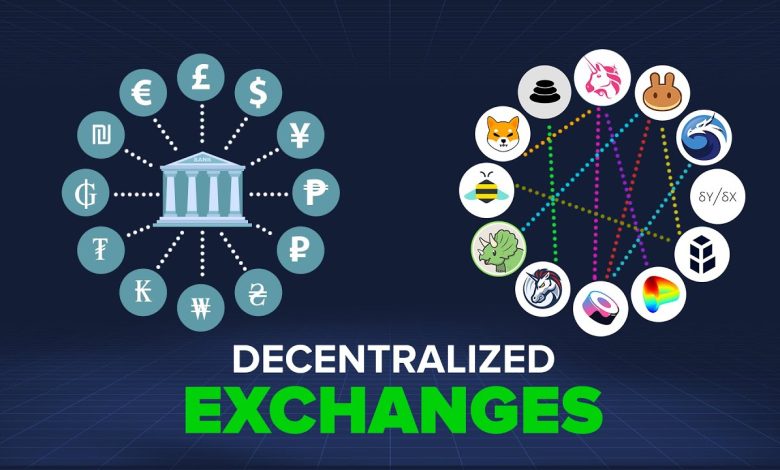How to Use Decentralized Exchanges (DEXs)

- Understanding Decentralized Exchanges (DEXs)
- Benefits of Using Decentralized Exchanges
- Choosing the Right Decentralized Exchange for You
- Security Measures to Consider When Using DEXs
- Tips for Trading on Decentralized Exchanges
- The Future of Decentralized Exchanges
Understanding Decentralized Exchanges (DEXs)
Decentralized exchanges (DEXs) are platforms that allow users to trade cryptocurrencies directly with one another without the need for a central authority to facilitate the transactions. This peer-to-peer model offers several advantages over traditional centralized exchanges, including increased security, privacy, and control over funds.
One of the key features of DEXs is that they do not hold users’ funds. Instead, trades are executed through smart contracts on the blockchain, which means that users retain ownership of their assets throughout the trading process. This reduces the risk of hacks and theft that can occur on centralized exchanges.
Another benefit of DEXs is that they are typically more resistant to censorship and government intervention. Because there is no central point of control, it is much harder for authorities to shut down or regulate these platforms. This can be especially important for users in countries with strict capital controls or oppressive regimes.
While DEXs offer many advantages, they also come with some drawbacks. One of the main challenges is liquidity, as decentralized exchanges often have lower trading volumes than their centralized counterparts. This can result in higher slippage and less favorable prices for traders.
Despite these limitations, DEXs are becoming increasingly popular among cryptocurrency enthusiasts who value the principles of decentralization and self-sovereignty. By understanding how decentralized exchanges work and the trade-offs involved, users can make informed decisions about whether to use these platforms for their trading needs.
Benefits of Using Decentralized Exchanges
Decentralized exchanges (DEXs) offer several benefits compared to centralized exchanges. One of the main advantages is **increased** security. DEXs do not hold users’ funds, reducing the risk of hacks and theft. Additionally, transactions on DEXs are **peer-to-peer**, meaning users have more control over their assets.
Another benefit of using DEXs is **privacy**. Since users do not need to create accounts or provide personal information, their transactions are **anonymous**. This can be appealing to those who value their privacy and want to keep their financial activities confidential.
DEXs also promote **financial** inclusion by allowing anyone with an internet connection to trade assets. There are no restrictions based on location or identity, making it easier for people in **underserved** regions to access financial services.
Furthermore, DEXs offer **lower** fees compared to centralized exchanges. Since there is no intermediary involved in transactions, users can avoid paying high fees for trading. This can result in **significant** savings, especially for frequent traders.
In conclusion, decentralized exchanges provide a secure, private, and cost-effective way to trade assets. By leveraging the benefits of DEXs, users can take control of their finances and participate in the growing world of decentralized finance.
Choosing the Right Decentralized Exchange for You
When it comes to choosing the right decentralized exchange (DEX) for your needs, there are several factors to consider. One of the most important things to look at is the user interface. Make sure the DEX you choose has an intuitive and user-friendly interface that makes trading easy and efficient. Additionally, consider the security measures in place on the DEX. Look for exchanges that offer robust security features such as two-factor authentication and cold storage of funds.
Another important factor to consider is the range of cryptocurrencies available for trading on the DEX. Make sure the exchange supports the coins you are interested in trading. Additionally, consider the liquidity of the exchange. A DEX with high liquidity will allow you to make trades quickly and at competitive prices.
It’s also important to consider the fees associated with trading on the DEX. Look for exchanges that offer competitive fees and transparent pricing structures. Additionally, consider the customer support options available on the exchange. Choose a DEX that offers responsive customer support to help you with any issues that may arise.
Overall, when choosing a decentralized exchange, it’s important to consider factors such as user interface, security, cryptocurrency availability, liquidity, fees, and customer support. By taking these factors into account, you can find the right DEX for your trading needs.
Security Measures to Consider When Using DEXs
When using decentralized exchanges (DEXs), it is crucial to consider various security measures to protect your assets and personal information. One of the most important steps you can take is to **use** a **hardware wallet** to store your **cryptocurrencies** securely. This **hardware wallet** provides an extra layer of protection by keeping your **private keys** offline and out of reach of **hackers**.
Another **security measure** to consider is **using** a **VPN** when **accessing** a DEX. A **VPN** encrypts your **internet** connection and **hides** your **IP address**, making it more difficult for **cybercriminals** to **intercept** your **data**. Additionally, **be** sure to **enable** **two-factor authentication** on your **DEX** account to **add** an extra **layer** of security.
It is also **essential** to **verify** the **smart contracts** of the **DEX** you are **using** to ensure they are **secure** and **free** from **vulnerabilities**. **Regularly** **update** your **software** and **keep** your **devices** **secure** to **prevent** **malware** and **phishing attacks**. **Lastly**, **be** cautious of **phishing** **emails** and **websites** that may **attempt** to **steal** your **login** **credentials**.
By **implementing** these **security measures**, you can **help** **protect** your **assets** and **personal** information when **using** DEXs. **Remember** that **security** should **always** be a **top** **priority** when **engaging** in **cryptocurrency** **trading** on decentralized exchanges.
Tips for Trading on Decentralized Exchanges
When trading on decentralized exchanges (DEXs), there are several tips to keep in mind to ensure a smooth and successful experience. Here are some key pointers to help you navigate the world of DEX trading:
- Research the DEX platform you plan to use thoroughly before making any trades. Understand its features, security measures, and user interface to make informed decisions.
- Always keep your private keys secure and never share them with anyone. Your private keys are essential for accessing your funds on a DEX, so protecting them is crucial.
- Diversify your investments across different assets to minimize risk. Avoid putting all your funds into a single asset to protect yourself from potential losses.
- Stay updated on market trends and news to make informed trading decisions. Being aware of the latest developments in the cryptocurrency space can help you anticipate price movements.
- Consider using limit orders instead of market orders to have more control over the price at which your trades are executed. This can help you avoid unexpected price fluctuations.
By following these tips, you can enhance your trading experience on decentralized exchanges and increase your chances of success in the cryptocurrency market. Remember to always trade responsibly and stay informed to make the most of your DEX trading journey.
The Future of Decentralized Exchanges
The future of decentralized exchanges (DEXs) looks promising as more users become aware of the benefits of trading without relying on a central authority. DEXs offer increased security, privacy, and control over funds compared to traditional exchanges. With the rise of blockchain technology, DEXs are expected to play a significant role in the future of cryptocurrency trading.
One of the key advantages of DEXs is the ability to trade directly from your wallet without the need to deposit funds on an exchange. This eliminates the risk of hacks or theft of funds from centralized exchanges. Additionally, DEXs allow users to maintain control of their private keys, providing an extra layer of security.
Another benefit of DEXs is the ability to trade a wide range of tokens without the need for a third party to facilitate the transaction. This opens up opportunities for users to access a more diverse range of assets and participate in new projects without restrictions. As the cryptocurrency market continues to evolve, DEXs are expected to become more user-friendly and accessible to a wider audience.
In conclusion, the future of decentralized exchanges is bright, with more users recognizing the advantages of trading on a platform that prioritizes security, privacy, and control. As blockchain technology continues to advance, DEXs are likely to become the preferred choice for many cryptocurrency traders looking for a more secure and transparent trading experience.




